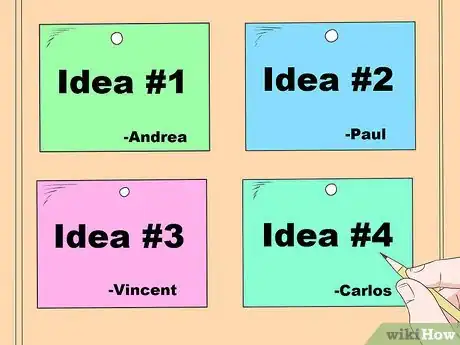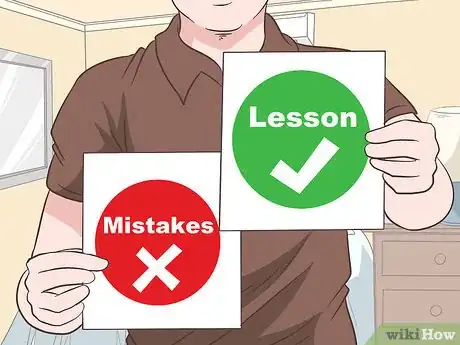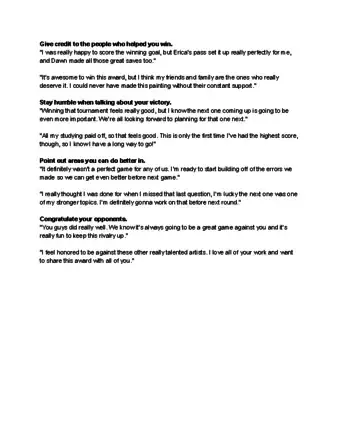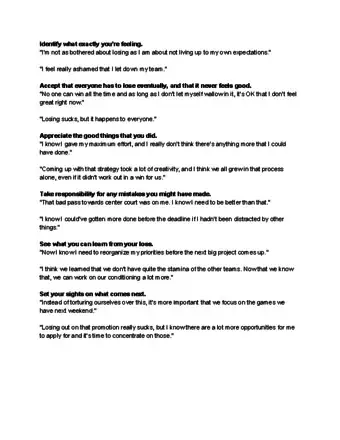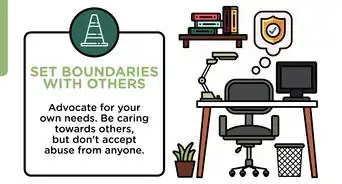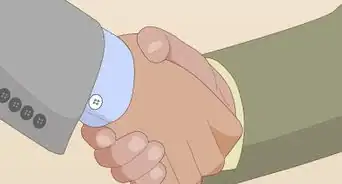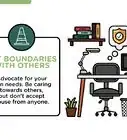This article was co-authored by Trudi Griffin, LPC, MS. Trudi Griffin is a Licensed Professional Counselor in Wisconsin specializing in Addictions and Mental Health. She provides therapy to people who struggle with addictions, mental health, and trauma in community health settings and private practice. She received her MS in Clinical Mental Health Counseling from Marquette University in 2011.
There are 7 references cited in this article, which can be found at the bottom of the page.
This article has been viewed 200,864 times.
Whether in sports, dating, academia, or the workplace, competition is a fact of life. For some, however, competition can turn into this “dog eat dog" mentality that involves throwing others under the bus to find success. It doesn't have to be that way, though. Competition can be healthy and non-destructive—it all comes down to good sportsmanship. Try to exercise fairness in your competitions with others, but also learn to appropriately handle wins and losses. Do this and you'll find that you can compete with others without making enemies.
Steps
Being Fair
-
1Be courteous. Showing respect for others is essential if you want to stay on the healthy side of competition. This allows you to consider others’ feelings. That way, no one is overtly hurt or disrespected, even during a competition.
- Basic ways to be courteous include saying “please” and “thank you,” taking turns, and apologizing for wrongdoing.
- Basic courtesy can be seen when competing opponents shake one another’s hands before a match. Doing this sends the message that you respect the other person, even though you’re on different sides.
- You can also be courteous by practicing humility when you accomplish a goal. Avoid cheering for yourself or being too self-congratulatory.
-
2Voice your opinions, but hear others out, too. Feel free to share your thoughts and feelings without fear of being silenced or ignored. However, you should also extend this courtesy to others. State your opinions and needs, but be an active listener, too.[1]
- Once you've tactfully said your part, let the other person talk. Make eye contact, turn to face them, and use open body language that encourages a dialogue.
- Sitting back and listening every now and then exhibits fairness. Plus, you might learn something from what others say.
Advertisement -
3Build on your opponent's ideas, but give them credit. Healthy competition invites everyone to participate in brainstorming and innovating. Yet, you could burn bridges if you knowingly steal other people's ideas. Show fairness by giving credit to the original source, even if they are your biggest competitor.[2]
- For example, you might say, “Jared came up with the idea of bringing our clients on-board periodically to get their input. I figured why not take that idea further and allow them to see project updates in real-time.”
- Keep in mind that cheering on your coworkers and surrounding yourself with high-achievers will help you to be successful as well.
-
4Play by the rules. If you want to compete in a constructive way, be fair in the way you play the game. Every competitor should have the same advantage, so don't sabotage others, spread rumors, cheat, or take actions that directly hinder their progress.[3]
- Follow the established standards in your activity or line of work. Breaking the rules may help you to win, but it may also ruin your reputation. Play fair and you'll earn other's respect and admiration.
Handling Victories Well
-
1Resist the urge to boast. Bragging about your successes can annoy others and make you appear arrogant. Instead, humbly acknowledge your victories without much pomp and circumstance.[4]
- Try to avoid saying things like, "That's right! You ate my dust!" or calling your opponent a "loser" after winning a race.
- This doesn't mean you shouldn't celebrate victories—just don't go out of your way to rub the loser’s nose in your victory.
-
2Compliment your opponent's efforts. Even if you surpassed your competition in the end, they still put up a fight. Give them credit for the energy they put into the competition. This goes a long way towards you earning other's respect and staying humble.[5]
- For example, if you and another coworker both were up for a promotion, you might say, “Jake, you were a very worthy candidate. I know it's only a matter of time before you're promoted.”
- Be sure you do this humbly and authentically. It shouldn't serve as a way for you to show off.
-
3Recognize the contributions of your teammates. Destructive competitors boast and claim all the credit for themselves. However, to compete in a non-destructive way, it's a good idea to acknowledge the help and cooperation you received from others—especially those who are on your side.[6]
- If you're successful at something, be sure to identify others, such as teammates or mentors, who are responsible for helping you get the victory.
- This might sound like, “Thanks, everyone, but I couldn't have done it without Janice. Her talent was essential to the win.”
- When you do this, you become a team-player. Showing respect and consideration for your teammates is just as important as being civil with your competitors.
-
4Reflect on victories to gain insight. After a victory, take some time to think about what went right and what could have been improved. This will help you to learn from the experience and improve your chance of more future successes. Ask yourself:
- What did my team and I do well?
- What do my team and I need to work on?
Dealing with Losses
-
1Accept the outcome. Don't lose your head and start complaining or accusing others if you experience a setback or failure. If the decision was mostly fair, acknowledge the loss and move forward.[7]
- Being in denial or placing blame makes you look like a sore loser. It also takes the responsibility of your performance away from you and places it somewhere else.
- By accepting the outcome—whatever it may be—you show that you are okay with losing, and that the outcome isn't always what's most important.
- This suggestion is not relevant to situations when you feel like you were cheated or discriminated against in some way. In such situations, don't stay quiet. Take your grievances to the proper authorities.
-
2Applaud when others win. Healthy competition means you accept the fact that you won't always win, and that you can still congratulate others when they do. Politely pat the winners on the back to show that you're not a sore loser.[8]
- Use this strategy for applauding your own opponent and for congratulating friends who may enjoy successes that you don't.
- Keep in mind that if you are gracious when others win, they are more likely to follow your lead and behave similarly when they lose.
- You can also use other people’s victories as examples to help you be successful in the future. Examine what they have done well and how you might do something similar.
-
3Learn from your mistakes. As you get accustomed to losing, you'll notice that your biggest competitor is yourself. Your primary focus should be on steadily improving over time. Therefore, don't dwell too much on losses. Simply use them to evaluate your mistakes and apply what you learn to future situations.[9]
- For example, if you don't get picked as first chair in this year's orchestra, get feedback to find out how you can better your skills. Practice, evaluate your progress, and try again next year.
-
4Challenge negative self-talk. It's easy to fall into self-hatred when you're competing with someone and they win. “He's so skilled at chess,” becomes, “I'm such a loser.” When this happens, realize that someone else's success does not have to translate to your failure and change your tune.[10]
- You might challenge these thoughts by reminding yourself about other activities you're good at, or even reflect on how your skills in the area in question have improved.
- For example, you might change, “I'm such a loser" into, “I'm gradually becoming a better chess player.”
-
5Stay calm when your opponent tries to bait you. Sometimes, the one with poor sportsmanship isn't actually you. You may lose one round to an opponent who immediately starts trash-talking you. Don't play into this destructive behavior. Try some self-soothing techniques to stay calm.[11]
- Chat with someone to distract yourself. Take slow, deep breaths in through your nose and out through your mouth. You might also try counting silently to 10, 50, or whatever number works for you.
Fostering Healthy Competition
References
- ↑ https://ggia.berkeley.edu/practice/active_listening
- ↑ https://www.psychologytoday.com/us/blog/the-mindful-self-express/201109/how-keep-your-cool-competitive-people
- ↑ http://raisingchildren.net.au/articles/playing_fair.html
- ↑ http://raisingchildren.net.au/articles/playing_fair.html
- ↑ https://www.psychologytoday.com/us/blog/the-mindful-self-express/201109/how-keep-your-cool-competitive-people
- ↑ https://hbr.org/2012/03/give-credit-where-its-due
- ↑ https://kidshealth.org/en/teens/sportsmanship.html
- ↑ https://kidshealth.org/en/teens/sportsmanship.html
- ↑ https://www.parents.com/kids/development/social/why-competition-is-good-for-kids-and-how-to-keep-it-that-way/


